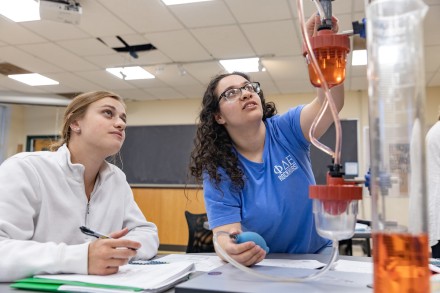The Rockhurst University biomedical physics major prepares students for graduate or clinical research programs in multiple intersections of physics, biology and medicine.


Program Overview
With an interdisciplinary complement of required courses, biomedical physics students can design upper-division courses to meet their research and career choices. Three career options highlighted in this major are biophysics, medical physics and medical school.
What is biophysics?
Biophysics is a vibrant, growing research field that applies the theories and methods of physics to understand how biological systems work. Biophysics is critical to understanding the mechanics of how the molecules of life are made, how different parts of a cell move and function, and how complex systems in our bodies — the brain, circulation, immune system, and others — work.
What is medical physics?
Medical physics is an applied branch of graduate physics focused on the application of the concepts and methods of physics to the diagnosis and treatment of human disease. It is allied with medical electronics, bioengineering, and health physics. Medical physicists contribute to the effectiveness of radiological imaging procedures by assuring radiation safety and helping to develop improved imaging techniques (e.g., mammography, CT, MRI, ultrasound, nuclear imaging). They contribute to the development of radiation therapeutic techniques (e.g., radioactive implants, stereotactic radiosurgery, proton therapy), collaborate with radiation oncologists to design treatment plans, and monitor equipment and procedures to ensure that cancer patients receive the prescribed dose of radiation to the correct location. A career in medical physics involves three areas of activity: research and development, clinical service and consultation, and medical physics education.
Preparing for med school
For students interested in attending medical achool: The Rockhurst University biomedical physics major provides you with the ability to fulfill your pre-med requirements within a strong science major that presents multiple research opportunities.
Learning Outcomes
- Demonstrate proficiency in understanding and learning key concepts of physics related to biology and the medical field.
- Show the ability to analyze a broad range of physical phenomena using the understanding of selected topics from medical physics and bioengineering.
- Demonstrate proficiency in oral and written scientific communication.
- Ability to think critically and work independently.
Program Outcomes
Students with a Rockhurst biomedical physics degree have gone on to medical school and/or research graduate programs in biophysics, medical physics, or biomedical engineering. The degree sets you up for success in whatever comes next in your journey toward your biomedical physics career.
Biophysicist
Scientist
Nuclear engineer
Data Analyst
Health Care Professional
Radiation Therapist
Medical Technologist
Nuclear Medicine Technologist
Course Map
Degree and class descriptions and requirements can be found by clicking on the course catalog listing below:
Popular Courses
This course will emphasize the scientific method and physical reasoning, particularly a conceptual understanding and the applicability of physics to the students’ major area of study and career interests. Course content will cover concepts of classical mechanics: conservation of energy and momentum, forces, motion and waves.
A calculus-based introduction to physics for students majoring in science or engineering. With an emphasis on the scientific method and problem-solving through physical and conceptual reasoning, the course content will focus on a study of Newtonian mechanics, thermodynamics, sound and waves with applications for scientists and engineers.
This course focuses on an introduction to areas of modern physics required for an understanding of contemporary medical diagnostic and treatment procedures. Topics include a focus on the physics underlying modern medical diagnostic and therapeutic technology: the EM Spectrum, Radiology (X-Ray, CT), Nuclear Medicine (Gamma Camera, SPECT, PET), MRI, hybrid instrumentation and radiation treatment.
A study of experimental methods currently being used to rapidly advance the fields of molecular biology, medicine, genetics, and other areas in the biological sciences. This course involves reading and discussion about techniques used for exploring cellular and molecular biology. Techniques will include restriction mapping, protein and DNA purification, ELISA, bioinformatics and other modern techniques.
Degree Info
- Students pursuing a biomedical physics degree at Rockhurst may have the opportunity to join the Society of Physics Students.
- Majors may also become involved in Sigma Pi Sigma, the national physics honor society.
- Learn from esteemed faculty that earned the 2019 "Award for Improving Undergraduate Physics Education" from the American Physical Society.
Find Your Program
Choose topic to quickly find specific program details
